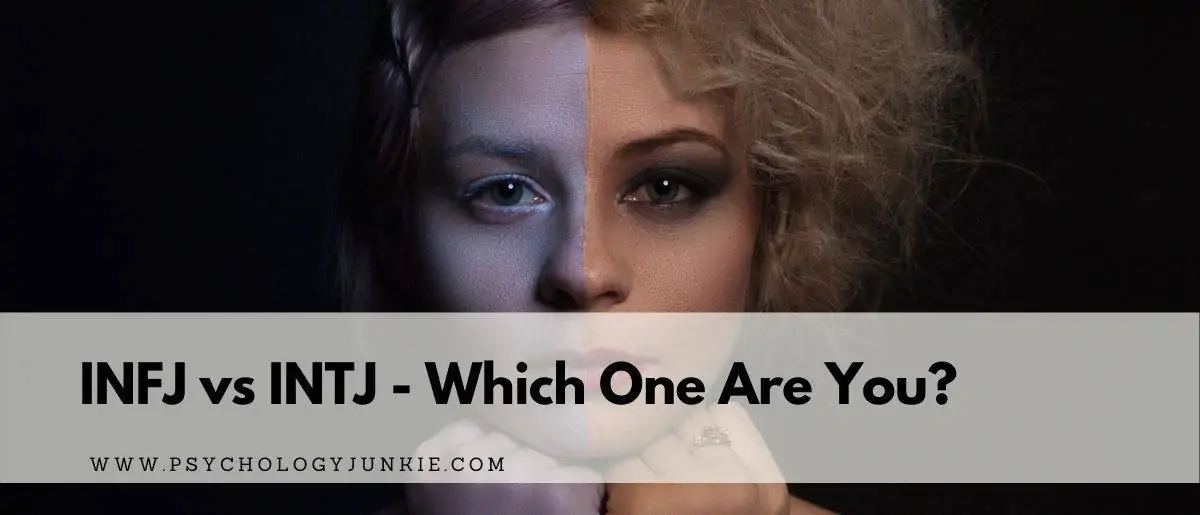INFJ vs INTJ – Which One Are You?
How do you know if you are an INFJ vs INTJ? I know many INXJs get stuck on solving this big existential puzzle. No matter if you’re an INFJ or an INTJ, you’ll find that you are a highly focused, self-controlled person with a strong sense of direction. You value vision and goals and can work with a single project for a long time without getting bored. As an INFJ ‘Philosopher’ or INTJ ‘Visionary’, you lead with a process known as Introverted iNtuition, or ‘The One Idea.
This is a visual-imaginative cognitive function, giving you the ability for organized creativity. Having dominant Introverted iNtuition means being able to pursue a specific idea and goal with confidence and enthusiasm. But what are the differences between INFJs and INTJs? In short, the INFJ is the high-minded, driven idealist, and the INTJ is the cool-headed brother, ambitious and fair.

In this article, we will compare INFJ and INTJ Thinking and Feeling, discuss the INFJ and INTJ cognitive functions, and the personality traits. I’ll show you 5 questions to help you know your personality type. Tell me which one you relate to most at the end of the article.
Table of contents
- 5 Questions To Decide If You Are An INFJ or INTJ
Estimated reading time: 8 minutes
5 Questions To Decide If You Are An INFJ or INTJ
Firstly, what I’ve found is that INFJs and INTJs are difficult to distinguish based purely on what we know about Thinking and Feeling. Both types tend to be in the middle on Thinking and Feeling, and end up identifying with both. Instead, we need the INFJ and INTJ cognitive functions to better understand these two personality types. So what are the INFJ cognitive functions?
The INFJ Cognitive Functions:
- Introverted iNtuition ‘The One Idea’
Where you conceptualise one big thought or project - Extroverted Feeling ‘People’
Where you communicate an idea to other people - Introverted Thinking ‘Reason’
Where you analyse problems and spot solutions - Extroverted Sensing ‘Action’
- Where you take action to make an idea real
The INTJ Cognitive Functions:
- Introverted iNtuition ‘The One Idea’
Where you conceptualize one big thought or project - Extroverted Thinking ‘Systems’
- Where you set goals or targets to achieve
- Introverted Feeling ‘Character’
- Where you work on yourself and your own needs
- Extroverted Sensing ‘Action’
Where you take action to make an idea real
Because INTJs and INFJs have different cognitive functions, they will answer differently on these five questions.
- Do You Value Honour Or Justice More?
With this question, you can figure out if your Feeling function is your secondary or tertiary function.
INFJ: Honour
Firstly, the INFJ personality type is far more concerned with ethical integrity and good moral conduct than the INTJ personality type. As a Philosopher, you have a strong code of honour. You temper yourself and work hard to make the right decision in every situation. Philosophers seek to set a positive example for the world to follow. Philosophers have a strong sense of pride and feel deep shame if they ever break one of their moral codes or perceived obligations to other people. Their desire to do what is right can overshadow their own more human side, causing them to repress or ignore personal needs.
INTJ: Justice
As an INTJ, you are more far more interested in justice in a global sense. Firstly, you are not beyond acting in your own self-interest and have no problem with getting your hands dirty, if it serves your goals in the long run. As a Visionary, you might think of the INFJ as unnecessarily strict from an ethical point of view. In your eyes, people are allowed to have selfish intentions and to look out for their own interests first. With that said, justice and fairness are important to you. The system should treat everyone fairly and everyone should have an equal chance to succeed. Those that are most competent deserve success and recognition for this.
- Do You Value Effectiveness higher than Harmony?
With this cognitive function, you can figure out if you are dealing with an Extroverted Thinking or Extroverted Feeling type.
INFJ: Harmony
Harmony is the long-term goal of any INFJ. This does not mean that you are not prepared to endure conflict and hardship in order to advance your vision, but that you always seek to communicate and make your ideas understood by the people around you. As a Philosopher, your desire to maintain peace can cause you to take the longer, more complicated route. You try to navigate interpersonal dynamics and to avoid criticism or conflict. That means you may choose your words carefully or take a more diplomatic route to avoid upsetting other people.
INTJ: Effectiveness
As an INTJ, you may perceive the INFJ way of communication as ineffective and drawn out. Philosophers use a lot of words and elaborate storytelling to get their point across. As a Visionary, you choose a more direct approach, even if it may rattle people’s feathers. At times, your approach can make you misunderstood by other people, who may feel threatened by your ideas or original approach. You’re a competitive person, though. If people have issues with your ideas, you’ll prove them wrong by simply demonstrating your ideas in practice.
- Do you value efficiency above authenticity?
I use this question to tell the difference between Introverted Thinking and Introverted Feeling
INFJ: Efficiency
As an INFJ, you tend to take an analytical approach to life. You see life as a series of obstacles or problems that have to be resolved. INFJs think like hackers, manipulating the fundamental rules of the world with the core goal of being useful for other people. As a Philosopher, you often seek to please people. You’re always thinking about how you can make yourself useful to humanity. However, people may not always notice your warmth. As a Philosopher, your analytical approach can make you come off as cold or calculated. People find it hard to connect with and know what your true intentions are. You are often quiet about your own feelings (except with those very close to you) and so people will often not understand what you are going through or how you are experiencing a situation.
INTJ: Authenticity
The INTJ personality type takes a more personal approach to life. You focus on your own individual expression, your character and your ethics and beliefs. As a Visionary, you are fundamentally more in touch with your feelings and interests. When there are problems and issues, you may respond more emotionally, complaining about the situation or expressing your pain or anger over what has happened. Unlike the INFJ, people can easily tell if you are upset and you will be more upfront and direct about how you are feeling. Sometimes, this will cause conflicts or issues for you, as it may put you at odds with other people.
- How do you respond to authenticity?
I use this function to tell the difference between how INTJs and INFJs respond to Introverted Feeling in other people.
INFJ: Actively
INFJs are highly receptive to the feelings and needs of other people. You take time to listen to and honour other people’s values. If other people make their feelings clear to you, you will take this into account when making decisions. You tend to pick up and shoulder other people’s feelings as if they were your own. People tend to feel very seen and understood by the Philosopher. Just be careful that you don’t forget about your own needs. You take a more active role, actively giving advice and offering help to address other people’s problems. Be careful not to overstep your boundaries, and do not offer help to people who do not want it.
INTJ: Passively
The Visionary may find it more difficult to deal with other people’s feelings. As an INTJ, you can often find other people’s feelings inconvenient or difficult. You tend to see people’s feelings as their own responsibility – ultimately – everyone is responsible for taking care of themselves. What other people are going through should not be your business. You understand that you have to take people’s feelings into account, especially close friends and loved ones, but it can be draining to hear someone complain for a longer time. You may also take a more passive approach, nodding or giving advice, but ultimately letting other people figure out their own problems. Sometimes, you might benefit from showing more interest in other people.
- How do you respond to conflict?
I use this question to spot how you deal with Extroverted Thinking in other people.
INFJ: Passively
INFJs find conflicts incredibly taxing. As an INFJ, you do what you can to avoid conflict. Strong and decisive people can make you feel pushed around or overrun. You may sometimes be too quick to give up in a discussion, just to please the other side. During conflict, you can be passive, letting other people lead or steer the discussion, while you take a more analytical approach. You may choose to turn the other cheek or let the other person win, if it can help de-escalate the situation. Just be careful that you don’t retreat too much inwards or let other people control you.
INTJ: Actively
The INTJ personality type is highly skilled in navigating conflicts. It is not that you like conflict, but you do like a chance to prove yourself and your abilities to other people. You can speak with confidence and assertiveness and make decisions quickly. You have no issue with criticism and can push through for what you want. At the same time, you can spark unnecessary conflict because you fail to navigate social etiquette. Sometimes, conflicts can be avoided if you are willing to meet with people as humans and compromise on smaller matters. If there is conflict, you will take an active role in resolving it, by force if necessary. Sometimes, you may benefit from being more gentle with other people.
So are you an INFJ or INTJ? If you’re still wondering, I have some tips for you:
Take my personality test to find out your personality type
What made you realize you were an INFJ or INTJ?
What are your biggest doubts about your personality type? Share your thoughts in the comments below!

Subscribe to Our Newsletter

Want to discover more about personality type? Get the inside scoop with Susan Storm on all things typological, along with special subscriber freebies, and discounts on new eBooks and courses! Join our newsletter today!













Erik calls INFJ prideful:
pride•ful prīd′fəl►
adj. Arrogant; disdainful.
adj. Highly pleased; elated.
Full of pride; insolent; scornful.
That is NOT me as an INFJ.
Hey Kelly, thank you for your comment.
I understand that you don’t relate to the term of being prideful, and I do not mean it in the sense of “arrogant or disdainful”. I use the term in the sense of acting with a sense that you are doing the right or good thing. INFJs value acting in a way that is morally congruent and in touch with their Extroverted Feeling. They can have a base fear of being evil or defective in some way. They want to act in a way that is the ideal way a person should act. I hope that makes more sense to you!
Best,
Erik
When i know for sure that what i’m doing is something right and for the benefit of the group or people in general, i feel proud. It motivates me to keep going and give me strenght. However, i related to INTJ’s charateristics a lot.
Unfortunately, it was articles like this one that had me misidentify as an INFJ for a long time (I’m an INTJ 1w9, a very common INTJ mix). This article sacrificed accuracy of the information for accessibility and efficiency. INFJs are not the ones concerned with morals. That’s INTJ with their Fi child. INFJs are concerned with harmony/ethics and depend upon others’ Fi to guide any moral endeavors they take on. The Fe of the INFJ are overstated in descriptions, while their Ti is understated. Without others’ Fi present, they can be quite cold and detached. What’s most defining is not their care for people (which tends to be reserved for the Se moment), but the ongoing development of their unique logic of the world. It’s the INTJ with a developed Fi that feels morals on an ongoing basis without any external feeling stimuli. INTJs can also be interested in and driven toward issues that help/impact humanity. Furthermore, INTJs introvert their feelings (Fi) and extrovert their thinking (Te). For the most part, people won’t know how they’re feeling most of the time because as the article stated, they feel that feelings are the responsibility of individuals themselves, including themselves. It is also a convergent function, so it is something well under their control. The INFJ is far more outwardly emotional than the INTJ, even though the INTJ might indeed be feeling more internally. That is not to say that INFJs wear their feelings on their sleeves, just that is more apparent than INTJs. To address everything in this article would take much too much time, but this was a start. My goal is to help others still learning to probe deeper than stereotypes.
I still can’t decide between INFJ and INTJ. People see me as reasonably empathetic, and I can in fact pick up on how they feel (sometimes without even consciously registering their presence). But I’m not interested in dealing with solving people’s emotional issues at all! It’s just annoying extra information, unless I can see it as part of a larger pattern. I resent being mugged for sympathetic attention. Also, I feel that my moods are blatantly obvious and always on the surface, but that they have little to do with who I really am – they are the visible ocean waves vs. the inaccessible ocean depths where everything’s really happening. I do like communicating abstract ideas, but the reception to them is generally chilly, so it’s not a way I really connect with people.
A through and through INFJ here and I will answer 3 out of the above 5 questions differently:
I value justice over honor – with extraverted feeling, INFJs have a ‘selflessness’ about them in the sense that they tend to keep the feeling of others over themselves. So how can personal sense of honour come above justice that is meant to serve all?
I also prefer authenticity over efficiency – INFJs have a stong personal moral code/ integrity. Authenticity is something they seek in others around them as well (some even call INFJs human lie detectors for this reason). I don’t see how they would prefer efficiency over authenticity. In fact, INFJs are known to be clumsy in practical matters, so efficiency? Efficient is not a word usually associated with Philosophers.
On the other hand, INTJs with their extraverted thinking are one of the most organized, analytical and practically efficient types.
I don’t like conflicts, but if there is one, I’d rather actively resolve it. But I understand this cannot be generalized for all INFJs and is rather more individual to me.
Thanks for this. I learn more and more about me (INFJ) and my husband (INTJ). This helps me to distinguish what we similarly have and what we differentiate from.
Thank you for this article. It has given me some interesting food for thought, although I have not yet been able to make it clear. In fact, my behavior can fit into both types of personality equally. My behaviour patterns fall into the infj or intj preferences depending on the situations or tasks I’m dealing with. I’ve tried the test on this site. The result has somehow confirmed what’s written above : 50%intj, 50%infj. Meaning: I easily switch between the two types. Perhaps, I just need to rethink some variable to find an answer. Or perhaps I could just be a psychopath..
Unfortunately, it was articles like this one that had me misidentify as an INFJ for a long time (I’m an INTJ 1w9, a very common INTJ mix). This article sacrificed accuracy of the information for accessibility and efficiency. INFJs are not the ones concerned with morals. That’s INTJ with their Fi child. INFJs are concerned with harmony/ethics and depend upon others’ Fi to guide any moral endeavors they take on. The Fe of the INFJ are overstated in descriptions, while their Ti is understated. Without others’ Fi present, they can be quite cold and detached. What’s most defining is not their care for people (which tends to be reserved for the Se moment), but the ongoing development of their unique logic of the world. It’s the INTJ with a developed Fi that feels morals on an ongoing basis without any external feeling stimuli. INTJs can also be interested in and driven toward issues that help/impact humanity. Furthermore, INTJs introvert their feelings (Fi) and extrovert their thinking (Te). For the most part, people won’t know how they’re feeling most of the time because as the article stated, they feel that feelings are the responsibility of individuals themselves, including themselves. It is also a convergent function, so it is something well under their control. The INFJ is far more outwardly emotional than the INTJ, even though the INTJ might indeed be feeling more internally. That is not to say that INFJs wear their feelings on their sleeves, just that is more apparent than INTJs. To address everything in this article would take much too much time, but this was a start. My goal is to help others still learning to probe deeper than stereotypes.
Definitely INFJ but it was close on a few points. What I think internally about how silly and short-sighted people are rarely gets said. In fact, I brace for conflict them cave like a house of cards and wonder: ‘why was I so nice? This person is an annoying moron!’ But I can’t help but keep the peace. I really liked the description of IN as the ‘One Idea’ it speaks to single-mindedness going to remember that one!
@Erik Thor
INTJ INTP for the next?
I was nailed as an INTJ when I felt the discussion on INFJ’s feelings seemed “ineffective and drawn out.” Then it seemed that their feelings became “inconvenient or difficult.” I have one daughter who can talk to me and another who can’t stand to because of my complete lack of regard for their feelings. The one who will talk to me recognizes my utter devotion to their happiness and success. If I make a huge effort and speak with high regard for everyone’s feelings, I can engage them both. It’s just a rare event and it requires dire circumstances. It is hard not to feel that being an INTJ is a curse to bear. I would rather be an INFJ anyday!
Thank you for your post.
Yes I do identify with both and your points do distinct the INFJ and INTJs which make it a lot clearer and I guess always thought my dominant side of the INFJ.
Thank you for your content
I am still ambiguous on whether I am an INTJ or INFJ…however more traits of INTJ than INFJ…so I would say I might be a well developed INTJ with INFJ tendencies
I am smack dab in the middle! I sucks here.
I personally don’t like this article as it is precisely why I mistyped as an INFJ for so many years – INTJs (especially if expected to conform to woman stereotypes) can be extremely sympathetic due to strong inner feelings, can prioritise harmony as an effective approach to get things done, and can even be prone to people pleasing depending on how they are raised. Saying that it’s either one or the other is an oversimplification.
I personally don’t like this article as it is precisely why I mistyped as an INFJ for so many years – INTJs (especially if expected to conform to woman stereotypes) can be extremely sympathetic due to strong inner feelings, can prioritise harmony as an effective approach to get things done, and can even be prone to people pleasing depending on how they are raised. Saying that it’s either one or the other is an oversimplification.
I also think the honour vs. justice one is incorrect. Honour is described as having a strong moral code – this is a core trait of Fi, which INTJs use but INFJs don’t. I’m not saying INFJs don’t have a moral code in a sense, but it’s more attributable to an INTJ (or INFP).
I’d say the difference between INTJ and INFJ’s morality is this: INTJ would feel that what is right is what is objectively fair. INFJ would feel that what is right depends on individual circumstances. Example: A person stole food to feel their starving family. The INTJ judge would punish them because they broke the law, and it’s unfair to not punish them just because they had a starving family. The INFJ judge would show leniency, maybe even let the person off the hook, because the INFJ would feel sorry for the person and feel that they broke the law for justifiable reasons.
Then I must be the first, because I am always wanting to understand the circumstances around things, but have a draw the line moral code too, but yes in certain circumstances I can be pretty understanding.
This confused me even more
I’ve noticed that this article shows INFJ as an extreme people-pleaser type which I disagree with as INFJs are more likely to follow their moral code than put other people first when certain circumstances demand them to.
However, I think I’m more likely to resonate with INTJ based on this article.
I think you are confused. From what I understand, you mixed the ideas as opposite.
I like how this page described ni: “This is a visual-imaginative cognitive function, giving you the ability for organized creativity. Having dominant Introverted iNtuition means being able to pursue a specific idea and goal with confidence and enthusiasm.” That i can agree is my dominant function. But most other sites say ni is spontaneous gut stuff which i dont relate to at all.
My answers:
1. Justice:intj
2. Both
3. …uh, i think this page got them backwards. Infjs should care more about authenticity, and intjs care more about efficiency. Anyway, i value both.
4. Passively:intj
5. Passively irl, actively online.
P.S. These descriptions all sound accurate, except for efficiency for INFJ and authenticity for INTJ. INTJ’s authenticity description sounds like INFJ’s honor description—ethical integrity. INTJs (not INFJs as this page says) are supposed to be all about efficiency. The contradiction is because of the flawed cognitive function theory. INFJ is an F type. INTJ is a T type. Who says INFJ has Ti as one of its top three functions? Who says INTJ has Fi as one of its top three functions? A theory which so far I have seen no evidence for.
Te seeks to want to listen and learn from others logic while Ti is adamant about their own logic as truth.
Fe seeks to “people please” for harmony in the external world while Fi seeks “authenticity” with their own feelings/ values being placed as more important than others’ feelings/ values.
As to whether if the logic or feeling detection is right or wrong is not the point here. That is due to other factors. The point here is the direction of the functions.
My Ti and Fi are higher than my te and fe. I’d say Fi is my dom, and Ti is my aux. The theory says this is impossible. Yet I exist. Therefore, the theory is flawed.
Putting people into preexisting boxes is the problem. The beauty of the 4 letter system is that you can take a quiz, and it spits out what you put in. But for cognitive functions, your results can make no sense based on the answers you input. There are only so many function stacks, and there isn’t a stack for every possibility. But the 4 letter system DOES have a possibility for everyone – 16 possibilities. For the function stacks to have every possible combination, there would need to be 64 function stacks! And then whether one particular stack correlates to one particular 4 letter type is a different matter entirely, which would require surveying thousands of people and seeing if there is statistical significance.